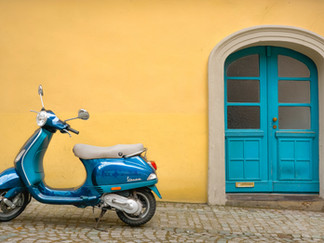Politically Correct: Being Italian in 2022.
- Melissa Lupo

- Jul 17, 2022
- 5 min read
Updated: Aug 23, 2023
In small and large cities across Italy there's nothing that will cause an aperitivo to go cold quicker than the mention of the words “politically correct.” Even in a forward-looking City like Milan, there is a lot of division over what can and can’t be said, that some believe is “all thanks to this maledetto politically correct” believed to be an American import.

Skipping translation, the foreign phrase is viewed as an alien concept for many Italians, calling it an invasion on the "Italian way of life".
Part of an Italian's identity is attached to the concept of "freedom of speech" as long as it's not hate speech, which is prohibited by law, following the sins of WWII. Italians are known internationally for saying what’s on their mind and for open and artistic expression. It’s part of the cultural identity woven into an unrivaled patrimony, comprising centuries of breathtaking art, architecture, philosophy, and music. As such, the tension around being “politically correct” transcends generations, baffling some, angering others, and signaling the winds of change for almost everyone.
The Origins of the phrase "PC" or "politically correct.
The phrase “politically correct” was adopted by Italy, from the United States. Mostly in use in America in the early 2000’s to describe the “correct” way the media should be addressing its diverse audience, the phrase became popular in response to vocal millennials calling for inclusivity and equal rights, beginning with adjusting the use of language rooted in bigotry. The American public referred to Political Correctness as being “PC” and made the subject of diversity an open conversation. Eventually the phrase fell mostly out of popularity after being invoked often and ironically by indignant public figures reluctant to adjust to the changing times, misappropriating the phrase to position themselves as the oppressed. A shift in overall awareness in society gave way to more conversations and debates about inclusion, a phenomenon that is often referred to now as “woke” culture, which like its predecessor, is also being misappropriated by the oppressors themselves.
Micro aggressions: hiding behind humor.
Pio e Amedeo, a comedic team popular on Italian prime time television, accused of making blatant racist jokes, were given an award last year for their unrelenting dedication to “saying what’s on their mind”, holding firm to the idea that they are protecting the right to self-expression and free speech.

After an overwhelming response from the public condemning the performers, the two comedians cried that the backlash was a result of the new “politically correct” culture and continued on with more racist jokes to solidify their position.
In general the consequences of using offensive language, are met with a classic defensive response from the offender,“non ci siamo capiti” or “you don’t get the joke” placing the blame on the "invasive, politically correct” culture.
While the phrase may be foreign, the concept is not. Using humor, especially irony as an attempt to disguise micro aggressions, defined by the Oxford dictionary as "indirect, subtle, or unintentional discrimination against members of a marginalized group", and outright racial and sexist discrimination, is a tactic as old as humanity itself.
Italian freedom of self-expression.
Italians from north to south have their unique ways of “telling it like it is.” Being direct and expressing with emotion is something that Italians are known for and consider part of their heritage, and reading the headlines in Italy, many feel that being politically correct is threatening their identity.
Almost anywhere the phrase “politically correct” is mentioned in the press, it's seen as a hindrance and overbearing to society that is ruining comedy and free expression, a classic trope used by oppressors to push back on requests for respect and inclusivity by the oppressed. A gay couple that kisses during an advertisement for candy is taken as highlighting homosexuality, and a gender-neutral deodorant is criticized as promoting an agenda or pandering. All of this is denying the reality that Italy, like the rest of the world, is a diverse place.
Immigration and Italy's declining birth rate.
The Italian archetype of a white old gentleman at a bar taking his espresso in the morning while flirting with a well-coiffed, young, white lady next to him hasn’t been relevant for a while.
The country with the second-oldest population in the world next to Japan, Italy has seen many years of declining birth rates, but immigration has remained steady. Scientists, medics, professors, engineers, and designers have been invited into the country from all over the world for decades to help enrich the collective knowledge and well-being of Italian society, many of them becoming citizens and having families of their own.
Chinese, Filipinos, Koreans, Indians, Africans, South Americans, North Americans and many other foreigners have arrived often by invitation or via scholarships designed to help the country grow and thrive, hoping for fresh perspectives and innovative solutions. Many of these foreigners who have dedicated their skills to the country, who have been living and working in Italy, also seek to integrate into Italian society. Decades later, the new generation of young Italians is a diverse mix of all these cultures, all born in Italy.
Italy's diversity is one of its strengths. Colory* shines light on Italy's diverse and talented youth.
Seeing a gap in media coverage of the next generation of young, talented, diverse Italians, a digital platform called Colory.it, created by American YouTuber and Author, Tia Taylor and the Palazzo Group, was launched to introduce the new generation of Italians that are doing interesting things across industries. Dancers, medics, producers, lawyers, and an endless array of new generation Italians that represent the talent leading the country are all featured. The platform also provides useful, well-researched information, guidance, and explanations about how Italian society and even the language is changing, all in an easy-to-share social media friendly format. Growing from 0 to almost 28k followers in just a short time, the Colory* Instagram account quickly became a reference for the arts and entertainment sector, even catching the attention and financial support of Google.
Being Italian Today
The truth is most Italians don’t ask themselves what it means to be Italian, mostly because they don't have to. Others however, have this question heavily on their mind, as fellow citizens remind them of it every day, even unintentionally.
The truth is most Italians don’t ask themselves what it means to be Italian, mostly because they don't have to.
MokokaBanana (Momoka), for instance, is a Chinese-Italian Roman influencer and commentator that was born and raised in Italy. Last year, the influencer made an Instagram video explaining in plain language why being asked constantly about her heritage can be distressing. Simple curiosity and even good intentions may make someone feel excluded as it positions the person as an outsider.
When the issue is raised, the breakdown in communication is often attributed to a phantom concept of "politically correctness" that in reality, has little relevance and reduces the argument to placating a political movement, instead of recognizing groups of individuals asking for equality and respect.
Elevating Italian excellence.
The next generation of Italians has a unique perspective to represent the beautiful country known for its landscapes, art, language, food, aesthetics, and culture. Italians looking to the future are finding ways to pass on traditions that the country is famous for and to connect Italy to other places through blended lives and lived experience, with the love of family, loyalty, and a respect for their roots.
As digital technology offers more transparency into other peoples' experience, discussions on diversity will continue to evolve, opening borders and removing blocks. Productive discussions not only on how to recognize racism but also conversations about anti-racism are happening now thanks to how Italians, through the artistic expression for which the country is known are connecting with each other. Now is a great time to ask what it means to be Italian and what the future, and Italy have to offer.
For more information on Colory*, the platform giving space to second generation Italians, go to: https://www.colory.info/






















Comments